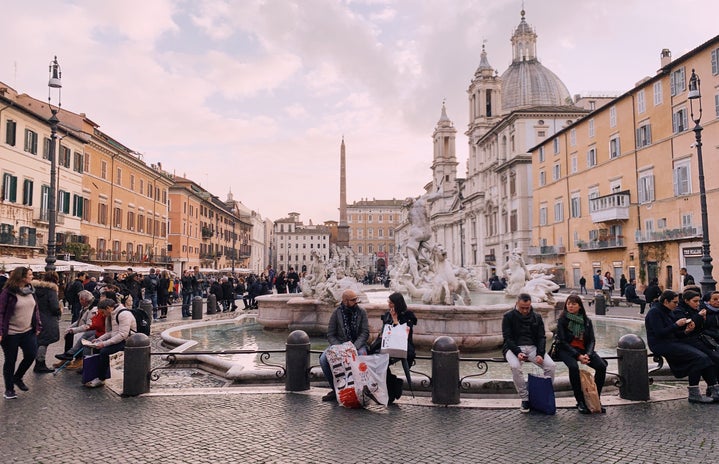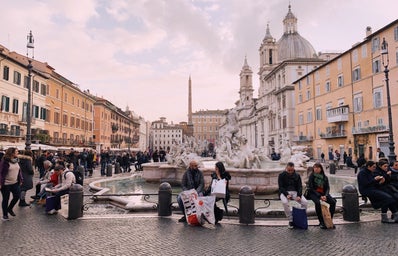As undergraduates hunt for pieces of advice for navigating their college career, both as optimistic freshmen with a world of experience to gain and those approaching the moment of graduating, there seems to be a common denominator between the two—taking advantage of UW’s plethora of options to study abroad, spanning across the world and in every thinkable area of study—is a hint that current and past students persistently offer up to those students now in their shoes. To get a better look at the study abroad application process and what makes successful applicants stand out amongst their competitors, I sat down with my roommate, Hannah Chen, a current junior majoring in Business Administration in the Foster School of Business, with two concentrations in Finance and Marketing. As she leaves for her winter quarter program in Rome in just a short three weeks, she graciously shared her thoughts about the essays, interviews, and her grand vision about what she hopes to gain from the once-in-a-lifetime experience.
1. Give us an overview of your program—what it is, what degree it’s for, AND how long it is.
I applied and was accepted into the Business Italy program. It’s eight weeks during winter quarter (January-March), and it offers upper division classes in Foster, including operations management, marketing, information systems, and a combined course with international business, which is taught by a faculty member local to Rome. Any student in Foster, regardless of major, is eligible for the program, since the classes are pretty broad.
2. What was the application process like? How would you approach the long essays, and what helped you?
The essays consist of one long personal statement of 500-750 words, and then two shorter statements of 250 words maximum. I rewrote my personal statement many times—I assumed they would be very selective with it, so I tried to emphasize what drew me to the specific program itself as far as location. I researched faculty, where classes were being held, and wrote out my personal ties to why Rome was important to me, which included how my personal interest in Rome’s art, history, and literature would be a very “enlightening” experience, beyond just the coursework in business. It took me a long time to write it, and then I realized that my original draft was what people wanted to hear, but I actually didn’t resonate with it. I completely redid the essay and told the truth about why I wanted to go, and it was much better the second time around when I was being truthful. For advice on the personal statement, I would advise to not tailor your responses to fit other people’s expectations, and instead just emphasize why you want to go and that will show through your words. I honestly said I didn’t know what I wanted to do in Rome specifically, but the application readers could tell I genuinely wanted to go despite that.
3. What was the interview process like, and what were some tips that helped you?
I drafted my answers to the typical questions for practice, including the common ones like “Why do you want to go?” and “What will you contribute to the program?” They asked me a lot of behavioral questions, like how I’d navigate a team challenge in the program or how I’ve handled living with roommates in the past. It was originally supposed to be a group interview, but one applicant didn’t show up, so it was just a 45 minute Zoom call with another student applying to the program. It was incredibly helpful to prep certain questions for the interviewers at the end, as usually they will be familiar with the program you’re applying to. Feel free to ask them about their personal stories within the program and what experiences they’ve seen memorably impact other students that have studied abroad in the past. For Foster programs specifically, they may ask you about current event happening in the country you’re applying to specifically, so it’d be wise to get a general sense of those. Overall, I would say to just be natural and not too nervous, if you can—it’s a pretty informal process.
4. After you were accepted, what were some additional steps you had to take to get to Rome?
First, once you get into the program, you have about a week to decide on if you’re going, but the main binding agreement is the payment contract, due a week and half or so after that. My program in Italy doesn’t require me to have a VISA, but I had to have a passport that’s valid at least six months after I come back, apparently for legitimacy. I also had to upload a scan of my passport and complete a predeparture checklist. My housing in an apartment and everything was all handled by program administrators, after they sent me a survey about my living preferences. More COVID-related, they recommend getting a booster shot before you go at this current time. You also have to buy traveler’s insurance, which is paid for out-of-pocket, just in case you get into any emergencies abroad. The insurance also covers doctor’s visits, (however no peripheral stuff like dentist or eye appointments), and compensates you in case of a travel delays or cancellations. UW’s study abroad insurance plan just changed and is now much more comprehensive now than it used to be, which is super helpful.
5. What are you most excited for in the program? To anyone applying to a competitive study abroad program, what is one piece of advice you’d give them?
Mainly because the experience will be so different than anything I’ve ever experienced before (mainly in the language and culture of Rome), immersing myself in a brand new city for two months and “being anonymous” in new experiences is something I’m really looking forward to. Because Seattle is so modern, I feel like everything fits together like a puzzle, so it’ll be nice to go to a city where everything is lively yet unembellished. As some advice for someone considering applying to their dream program, being bold and making sure your enthusiasm for getting out of your comfort zone and expanding your global mindset is something you repeatedly emphasize in the essays and interviews. I would also recommend to emphasize personal growth through meeting new people and experiences (even though everyone says that, it’s true!) Lastly, it’s important to personally find an equal balance of knowing you’re going on a study abroad program with academic demands, but also realizing you’re going to have fun with people you’ve never met.
If you’re considering applying for a study abroad program before you walk the graduation stage, get started here by reviewing some preliminary steps, or try searching for programs. As I too now ponder where my education can take me outside Seattle, I hope to follow up with Hannah for a recap of her residence in Rome when the Spring season rolls around.


